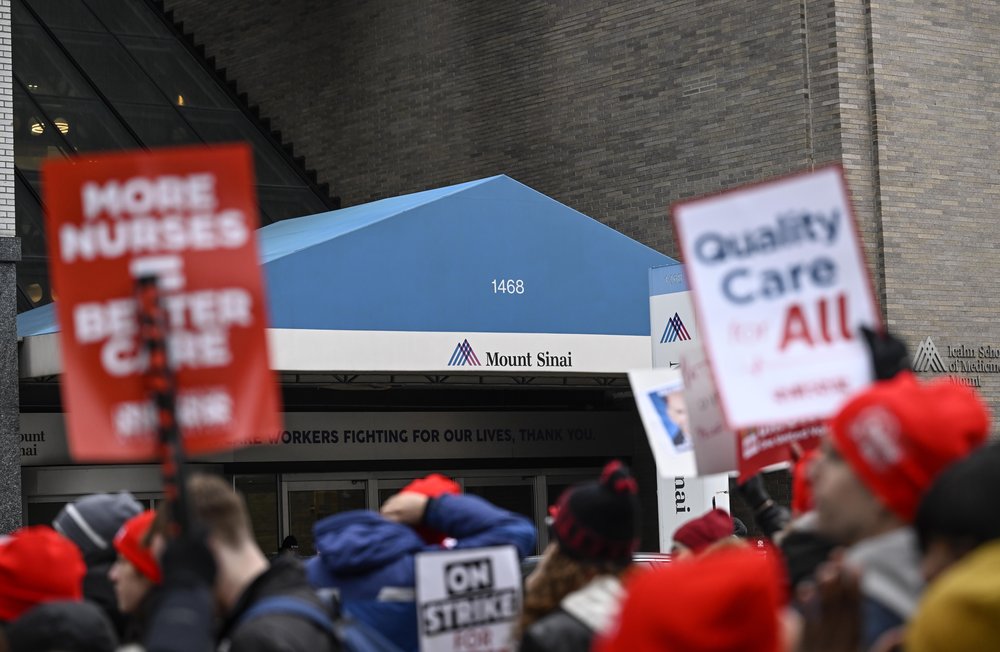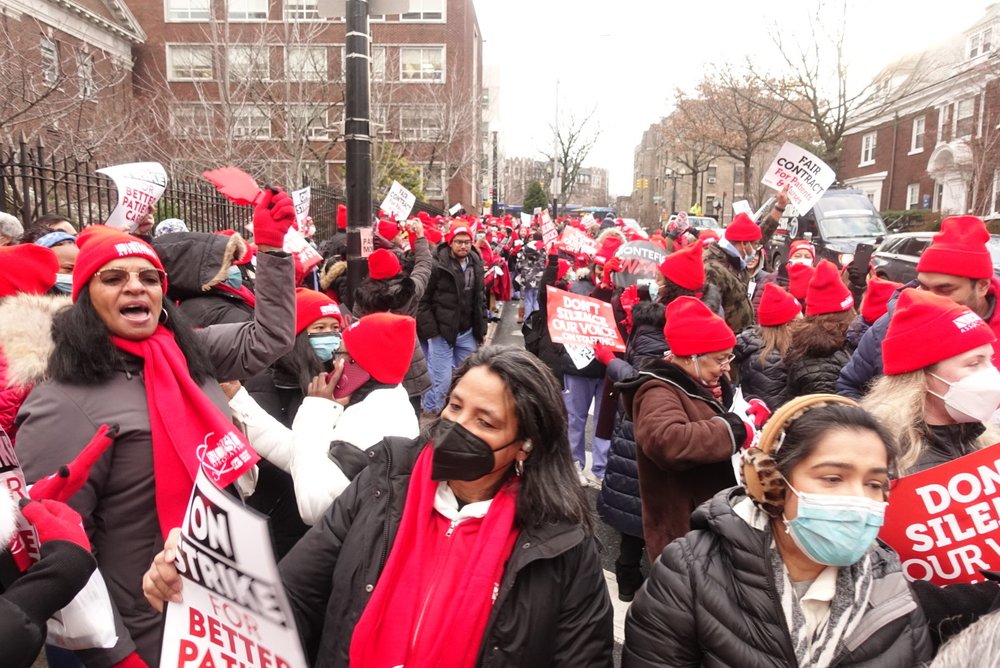Mount Sinai investigating newborn’s death during NYC nurses' strike
Jan. 31, 2023, 5:01 a.m.
The 4-month-old baby died in Mount Sinai’s neonatal intensive care unit on Jan. 11. The hospital initiated a review of his death last week, according to internal communications reviewed by Gothamist.

The death of a 4-month-old baby at Mount Sinai Hospital during this month’s nurses' strike is under internal review – and sources blame untrained fill-in nurses, overwhelmed doctors and executives who failed to prepare for the walkout.
The hospital initiated the review of the death in the neonatal intensive care unit last week, according to internal communications reviewed by Gothamist. A source present for the baby boy’s death in the unit, which specializes in caring for ill or premature newborns, referred to it as a “sentinel event” – an incident that requires immediate investigation and response.
The infant suffered from a severe heart condition, said sources who work in the NICU.
Staff failed to notice the infant’s low blood count on the morning of Jan. 11 – the third day of the strike – for hours, sources said, adding that the lab results normally would have been escalated immediately by seasoned NICU nurses.
Multiple sources, whose identities and qualifications were confirmed by Gothamist, described working in the NICU during the strike. Sources asked to remain anonymous because they were not authorized to speak about working conditions and feared losing their jobs. Gothamist also reviewed internal communications about the infant’s death and about the internal review.
“These babies can get very sick very quickly … That’s why subtle things you see are important to report, and highly trained NICU nurses do that,” said a source who worked in the NICU during the strike.
The baby, who sources said had been in the NICU since birth, died Jan. 11 during attempts to insert an IV, according to internal communications viewed by Gothamist.
The baby’s death raises questions about what was happening inside the hospital as thousands of nurses walked off the job and protested in the streets, demanding safer nurse-patient ratios and higher pay.

The hospital did not respond to multiple requests for comment about the internal review. The union did not respond to inquiries about the incident.
The internal review of the baby’s death could be escalated to the city’s medical examiner and the state Department of Health, though a DOH spokesperson would not comment on any potential active investigations.
“The New York State Department of Health takes instances of potential medical misconduct seriously,” said Cort Ruddy, a spokesperson for the department.
Sources described a “perfect storm” in the unit before the baby’s death.
During the strike, non-union nurses – referred to as “travel nurses” – were hired by the hundreds. Other nurse staff, who aren’t unionized, also remained on the job.
One travel nurse in the Mount Sinai NICU, a nurse source said, fell asleep during a shift and was asked not to return.
“They put nurses in there who had zero NICU experience,” said another source who was in the NICU during the strike.
That source described infant patients receiving medicine hours late on multiple occasions.
“Parents felt like they couldn’t leave their child’s bedside during the strike,” the source said.
NICU doctors, meanwhile, had responsibilities normally assigned to nurses, such as feeding the babies, taking vitals and administering medication, according to a physician in the Mount Sinai health system.
“I've seen and done a lot of difficult things in my career. I've held children when they died. But this was especially traumatizing,” the source working in the NICU during the strike said.
“I've been having nightmares every night.”
Mount Sinai runs a “level IV” NICU that treats the most critically ill and complex patients from across the tristate area. While deaths in the unit are not predictable, they typically do not happen weekly or even monthly, two sources said, emphasizing that the baby had been in the unit for months before his death.
Roughly four babies die for every 1,000 live births in New York City, according to 2019 data from the city’s Department of Health and Mental Hygiene.
Experts say highly specialized nurses are crucial in a level IV NICU, where babies require constant attention and undergo complex procedures like open heart surgery or connecting the infant to an artificial lung outside the body.
“[These babies] are not mini adults. In fact, they’re not even mini-children,” said Scott Lorch, associate chief of Neonatology at Children’s Hospital of Philadelphia.
“As babies get smaller or sicker, the skills that a nurse needs to care for them gets more specific.”
During the strike, Mount Sinai spokesperson Lucia Lee told Gothamist that the NICU was “appropriately staffed” with 17 nurses. Lee did not later respond on the record to detailed inquiries about the baby’s death.
Sources insisted the issue was not how many nurses were hired by hospital executives, but their qualifications.
Mount Sinai Hospital executives were aware of a possible strike as early as September 2021 when negotiations with the union began, according to Judy Gonzalez, president of the New York State Nurses Association.
The union issued an official 10-day strike notice in late December.
“But neither hospital had prepared adequately,” Gonzalez said of Mount Sinai Hospital and Montefiore Medical Center, where nurses also went on strike.
“There are many negative outcomes that occur as a result of understaffing, under-resourcing and inadequate training.”
In the days leading up to the strike, Mount Sinai transferred some babies in the NICU to other hospitals not affected by the walkout.
An MIT and Carnegie Mellon University study of nurse strikes in New York between 1984 and 2004 found that in-hospital mortality rates went up 20% during strikes.
Nurses detail turmoil inside NYC hospitals amid strike: ‘People don’t know what they’re doing’ How Mount Sinai's nurse strike ended: Details emerge around the final deal